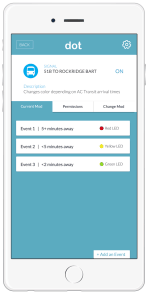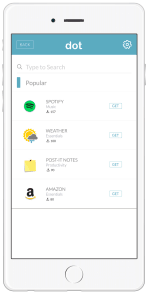Readers of this site know that a new technology promising us the moon hits the cyberwebs about once a week. Sometimes they actually deliver, too, but it’s rare. Usually, these devices are excellent solutions for a very limited range of problems. Usually.
Padtronix has learned of a device hitting Kickstarter in a couple weeks that has the potential to unlock the true potential of the Internet of Things.
Dot from Iota Labs is a $20 beacon that detects when your phone is within range. You configure Dot to perform a variety of tasks when it detects you, and that’s about it. Sounds simple, right? However, the problem with smart homes and IoT devices right now, is they don’t know where you are relative to where they are. Before a smart device can become useful, it must either guess what you want, i.e. Nest, or wait for you to issue a command, a la Echo. A true smart home knows where you are or what you are doing, and responds automatically to your needs. Dot is the first real solution to this simple, yet significant, problem. With Dot, your IoT devices have a way to know where you are.
Dot has the potential to change the nature of IoT
Knowing your physical location in a home unlocks a plethora of contextual, automatic functions that increase the practicality of Internet-enabled living by orders of magnitude. Actually, I’d say it has the potential to change the nature of IoT devices as we know them. Instead of devices you have to ask for help, Dot enables the smart home that thinks for you, that considers you and your movements, and takes the appropriate actions to accommodate you on it’s own, rather than sit idle until you ask for something.
 To use it, you just place Dot anywhere in your home or office where you might perform a task or could use the help of an app. When you come within range, Dot can launch apps, adjust smart home controls, issue location-based notifications, or even just alert you with specific reminders. Iota Labs’ co-founder Kunal Chaudhary, with a team of Berkeley engineers, set out to create a device with endless use cases and customizable functions. So, instead of buying something like an Echo which is locked down by hardware and software to a predefined range of functions, you can customize Dot to launch any number of apps, notifications, or features, based on where you place the Dot and what you need from it. In the same way IFTTT can be customized to your specific needs based on activity triggers, Dot brings that customization to your physical location.
To use it, you just place Dot anywhere in your home or office where you might perform a task or could use the help of an app. When you come within range, Dot can launch apps, adjust smart home controls, issue location-based notifications, or even just alert you with specific reminders. Iota Labs’ co-founder Kunal Chaudhary, with a team of Berkeley engineers, set out to create a device with endless use cases and customizable functions. So, instead of buying something like an Echo which is locked down by hardware and software to a predefined range of functions, you can customize Dot to launch any number of apps, notifications, or features, based on where you place the Dot and what you need from it. In the same way IFTTT can be customized to your specific needs based on activity triggers, Dot brings that customization to your physical location.

For instance, I could place a dot at the door from my house to my garage to remind me of what groceries I need for the day or to turn off any appliances and lights I might’ve left on. If I don’t have connected appliances, I can set it to launch my favorite navigation app for the drive to work. I could place one in a bathroom to launch Pandora or Spotify for a shower or soak. Actually, if I’m being honest, my bathroom is in range of a Pokestop, so …
One my dreams for my smart home is not yet realized, but Dot gets me one step closer. I’ve always wanted to be able to move from room to room and have any media I am consuming follow me. If I’m watching House Hunters in the living room, I want to be able to move to the kitchen or the bedroom, and have the TV switch off in the last room, and pop on automatically in the next. Dot doesn’t do this exactly, yet, but it allows my devices to know where I am within my home, which is a critical first step. Sure, I can tell Alexa to turn off my TV with my voice, but I want my home to do it for me without prompting. Dot potentially bridges this gap. And it does it without the use of additional hubs, wiring, or other clutter. With an open source model and a connected app platform, it’s looking like the smart home of our sci-fi dreams is taking a much anticipated step into reality thanks to Dot.
Be sure to check out Dot by Iota labs when it hits Kickstarter August 23rd. This is one we are definitely keeping an eye on.
*All images courtesy Iota Labs

